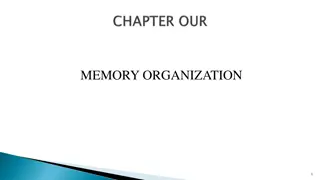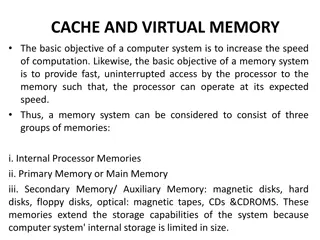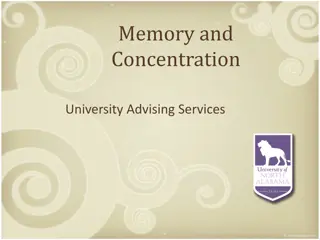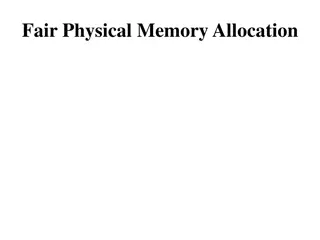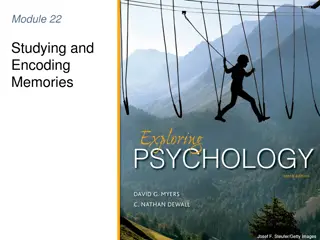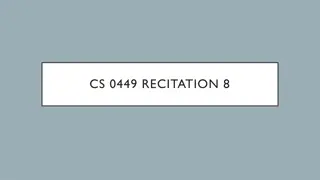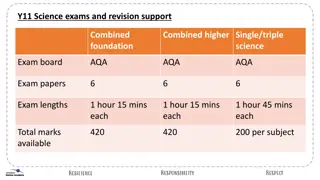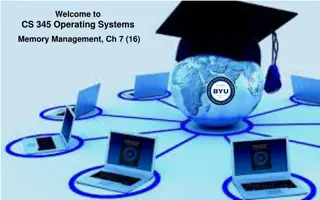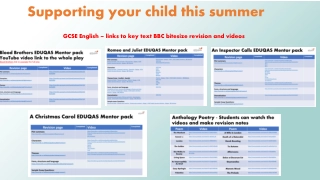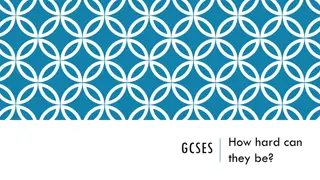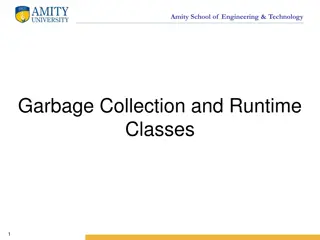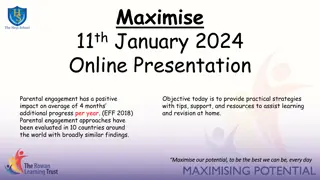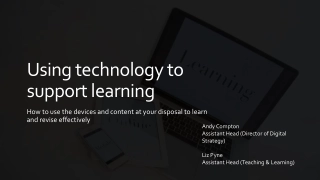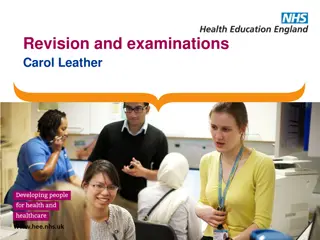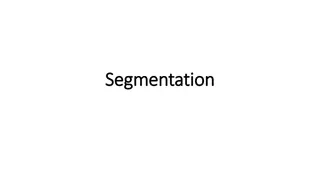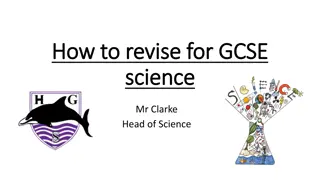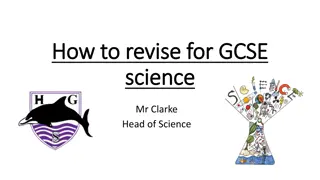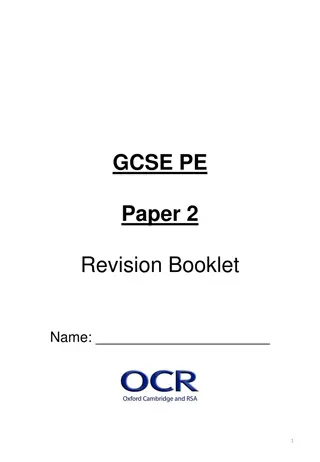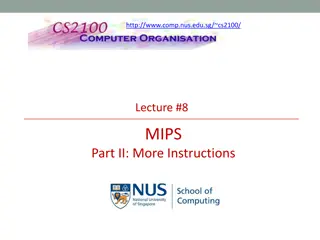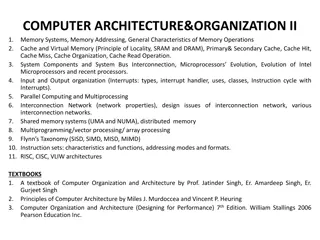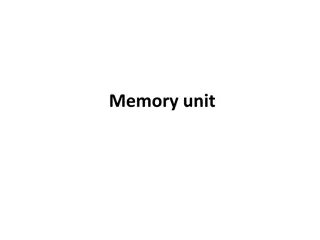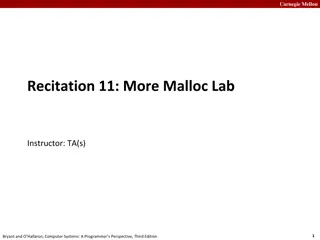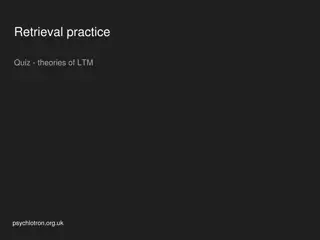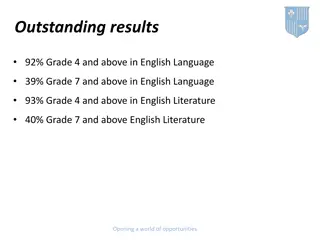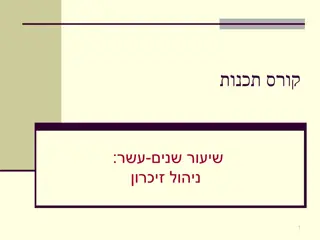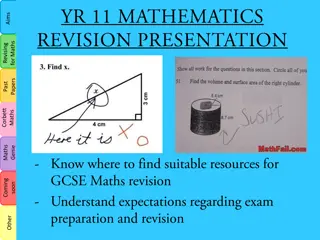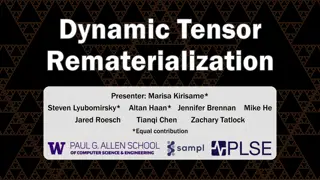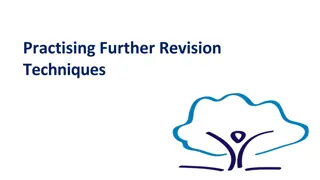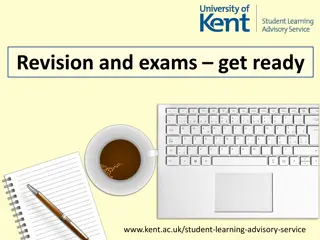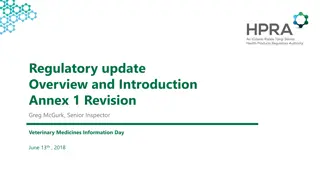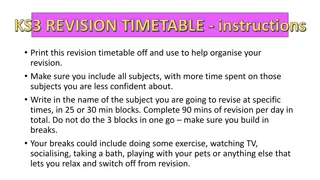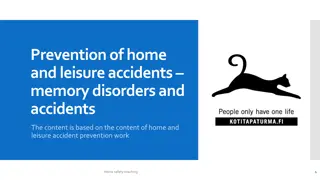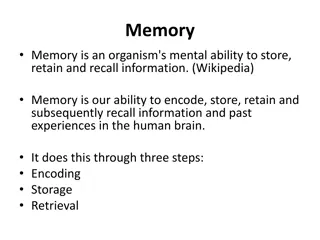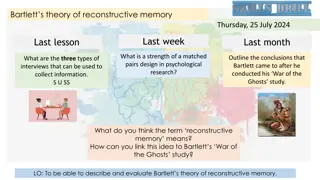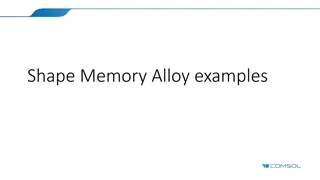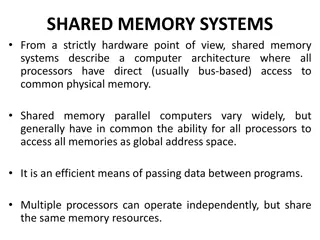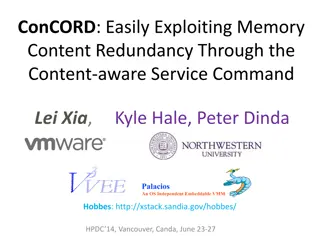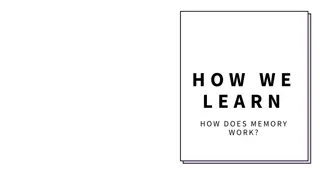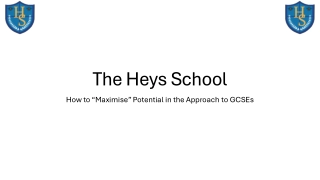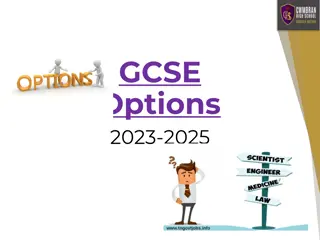Strategies for Improving Memory and Revision Techniques for GCSE Success
Enhance memory and revision skills for GCSE exams with effective strategies like retrieval practice, spaced practice, interleaving, elaboration, and dual coding. Avoid ineffective techniques such as highlighting and cramming. Encourage students to engage in retrieval practice with low-stakes quizzes and immediate feedback while fostering metacognition. Utilize resources from learning scientists to boost learning outcomes.
Download Presentation

Please find below an Image/Link to download the presentation.
The content on the website is provided AS IS for your information and personal use only. It may not be sold, licensed, or shared on other websites without obtaining consent from the author. Download presentation by click this link. If you encounter any issues during the download, it is possible that the publisher has removed the file from their server.
E N D
Presentation Transcript
Retrieval practice and other strategies to improve memory for terminal GCSE s Rachel Corcoran-Daldy daldyr@st-andrews-boys.org.uk @rcdbazinga
What strategies are you using with your students?
According to research, not all revision techniques are equal Bad: Highlighting & cramming Good: Retrieval practice, Spaced practice, lnterleaving, Elaboration, Concrete examples, Dual coding John Dunlosky, "Strengthening the Student Toolbox: Study Strategies to Boost Learning," American Educator, Fall, 2013. pp 12-21. Megan Smith & Yana Weinstein, The Learning Scientists: http://www.learningscientists.org/
Retrieval practice 3 phases Retrieval practice - e.g. low stakes quiz, fill in the gaps, spot the mistake, etc; best done regularly; include a mixture of topics (interleaving) Immediate feedback - to avoid misconceptions. Metacognition - Students should be encouraged to think about their thought processes and how easy it was to recall the information. http://www.learningscientists.org/
Retrieval Practice Challenge Grid: How is aluminium extracted from its ore? How many neutrons in Aluminium? What are the 3 types of radiation? Why do metals conduct electricity? Give two examples of exothermic reactions What acid is reacted with copper oxide to form copper sulfate? What does exothermic mean? What are the sub- atomic particles? How can endothermic reactions be measured? Why do ionic compounds have high melting points? How many atoms and elements are in CuSO4 How is radiation measured? Last lesson (1) Last week (2) 2 weeks ago(3) Further back! (4) https://www.retrievalpractice.org/
REFLECT Which colour was easiest? Why? Metacog Alpha Beta Gamma Electrolysis (when dissolved in cryolite) Delocalised electrons 27-13=14 Reaction that transfers energy to its surroundings Protons, neutrons and electrons e.g. combustion & Respiration Sulfurinc acid Using a Geiger- Mueller tube and measured in Becquerels By recording a drop in temperature using a thermometer. Giant lattice structure 6 atoms & 3 elements Last lesson (1) Last week (2) Last week (3) Further back! (4) https://www.retrievalpractice.org/
Why retrieval practice (and spaced practice) works Ebbinghaus (1885) forgetting curve (repeated Murre & Dros 2015 What can students do? 1. Practice questions (e.g. past papers, websites etc) 2. Make flashcards of anything you come across in your revision that you're unsure about (BOX UP regularly!) 3. Mind maps from memory (correct and add to them after!) https://en.wikipedia.org/wiki/Forgetting_curve
Metacognitive strategies Explicitly teach students metacognitive strategies: 1. Activating prior knowledge 2. Explicit strategy instruction 3. Modelling of learned strategy 4. Memorisation of learned strategy 5. Guided practice 6. Independent practice 7. Structured reflection How successful was it? How easy to apply? What situations could it be used in? Why did/didn t it work? Metacognition and self-regulated learning EEF Guidance report (2018)
Surprising benefits of low stakes testing and retrieval practice: Students tested on content that they hadn t previously been tested on did better if they had been used to frequent low stakes tests. Improves metacognitive monitoring, i.e. students have a more accurate calibration of their knowledge (and any gaps). Frequency encourages students to study regularly, rather than cram, which improves long-term retention and retrieval /Roediger, Putneam & Smith (2011)
Additional effects observed - The upshot of these low stakes retrieval quizzes is an increase in student confidence, a willingness to have a go , plus the ability to skip a question. /
Additional strategies employed- Modelling solutions WTM and exam technique revision have reduced student panic (as has the knowledge that that rabbit in the headlights sensation that is based on their fear of failure only lasts 10 minutes!) Elaboration (What does this link to? Desirable difficulty) Concrete examples (e.g. tell a story) Dual coding (e.g.make a video) Mind maps & flash cards /
Desirable difficulty Learning requires an active process of interpretation that is, mapping new things we are trying to learn onto what we already know . In short, try to spend less time on the input side and more time on the output side, . Any activities that . require you to retrieve or generate information, rather than just representing information to yourself will make your learning both more durable and flexible. Bjork & Bjork (2011) pp 62-63
How has this research changed my practice: Explicitly modelling and teaching revision strategies and allowing for metacognitive reflection (questioning) Incorporating Retrieval activities within SoW Focus on exam technique to increase student resilience What I m going to try next: Retrieve taking make notes AFTER the video rather than during. Traditionally I have championed making mind maps during videos etc, and then asking students to write them up . Negative marking (to reduce threat) https://www.retrievalpractice.org/archive/2018/5/11/retrieve-taking
Further info & resources Roediger, Putnam & Smith (2011) Ten benefits of testing and their applications to educational practice , Psychology of Learning and Motivation, Vol 55, pp1-36 Metacognition and Self-Regulated learning , Guidance report Education Endowment Foundation (2018) Gagn , R. and White, R. (1978) Memory Structures and Learning Outcomes, Review of Educational Research, 48(2), pp. 187-222. White, R. T. (1996) The link between the laboratory and learning. International Journal of Science Education, 18(7), pp. 761-774. Bjork & Bjork, Making things hard on yourself, but in a good way; Creating desirable difficulties to enhance learning , in Gernsbacher et al (eds.) Psychology and the real world:Essays illustrating fundamental contributions to society (2nd edn) pp59-68, 2011 John Dunlosky, "Strengthening the Student Toolbox: Study Strategies to Boost Learning," American Educator, Fall, 2013. pp 12-21. Megan Smith & Yana Weinstein, The Learning Scientists: http://www.learningscientists.org/ https://www.retrievalpractice.org/ https://www.innerdrive.co.uk/
"If you could choose only one thing this session you want to remember in 10 years, what would it be and why?" only one thing from Let me know what is/isn t working for you Rachel Corcoran-Daldy daldyr@st-andrews-boys.org.uk @rcdbazinga


